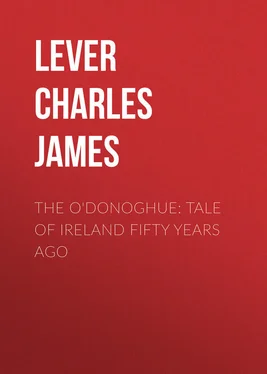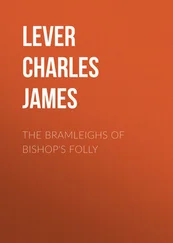Charles Lever - The O'Donoghue - Tale of Ireland Fifty Years Ago
Здесь есть возможность читать онлайн «Charles Lever - The O'Donoghue - Tale of Ireland Fifty Years Ago» — ознакомительный отрывок электронной книги совершенно бесплатно, а после прочтения отрывка купить полную версию. В некоторых случаях можно слушать аудио, скачать через торрент в формате fb2 и присутствует краткое содержание. Издательство: Иностранный паблик, Жанр: literature_19, foreign_antique, foreign_prose, на английском языке. Описание произведения, (предисловие) а так же отзывы посетителей доступны на портале библиотеки ЛибКат.
- Название:The O'Donoghue: Tale of Ireland Fifty Years Ago
- Автор:
- Издательство:Иностранный паблик
- Жанр:
- Год:неизвестен
- ISBN:нет данных
- Рейтинг книги:4 / 5. Голосов: 1
-
Избранное:Добавить в избранное
- Отзывы:
-
Ваша оценка:
- 80
- 1
- 2
- 3
- 4
- 5
The O'Donoghue: Tale of Ireland Fifty Years Ago: краткое содержание, описание и аннотация
Предлагаем к чтению аннотацию, описание, краткое содержание или предисловие (зависит от того, что написал сам автор книги «The O'Donoghue: Tale of Ireland Fifty Years Ago»). Если вы не нашли необходимую информацию о книге — напишите в комментариях, мы постараемся отыскать её.
The O'Donoghue: Tale of Ireland Fifty Years Ago — читать онлайн ознакомительный отрывок
Ниже представлен текст книги, разбитый по страницам. Система сохранения места последней прочитанной страницы, позволяет с удобством читать онлайн бесплатно книгу «The O'Donoghue: Tale of Ireland Fifty Years Ago», без необходимости каждый раз заново искать на чём Вы остановились. Поставьте закладку, и сможете в любой момент перейти на страницу, на которой закончили чтение.
Интервал:
Закладка:
“I know it, father, I know it all now,” said Sybella, as she came running up the slope from the lake.
“It is too late, my child; he has gone – left us for ever, I fear,” said Sir Marmaduke, as in shame and sorrow he rested his head upon her shoulder.
For some seconds she could not comprehend his words; and, when at last she did so, she burst forth —
“And, oh, father, think how we have wronged him. It was in his care and devotion to us, the poor fellow incurred’ our doubts. His habit was to sit beneath the window each night, so long as lights gleamed within. Till they were extinguished, he never sought his rest. The boatman tells me this, and says, his notion was, that God watches over the dark hours only, and that man’s precautions were needed up to that time.”
With sincere and heartfelt sorrow Sir Marmaduke turned away. Servants were despatched on foot and horseback to recover the idiot boy, and persuade him to return; but his path lay across a wild and mountain region, where few could follow; and at nightfall the messengers returned unsuccessful in their search.
If there was real sorrow over his departure in the parlour, the very opposite feeling pervaded the kitchen. There, each in turn exulted in his share of what had occurred, and took pains to exaggerate his claims to gratitude, for having banished one so unpopular and unfriended.
Alarm at the attack of the previous night, and sorrow for the unjust treatment of poor Terry, were not Sir Marmaduke’s only emotions on this sad morning. His messenger had just returned from Carrig-na-curra with very dispiriting tidings of Herbert O’Donoghue. Respect for the feelings of the family under the circumstances of severe illness, had induced him to defer his intended visit to a more suitable opportunity; but his anxiety for the youth’s recovery was unceasing, and he awaited the return of each servant sent to inquire after him, with the most painful impatience. In this frame of mind was he as evening drew near, and he wandered down his avenue to the road-side to learn some minutes earlier the last intelligence of the boy. It was a calm and peaceful hour; not a leaf moved in the still air; and all in the glen seemed bathed in the tranquil influence of the mellow sunset. The contrast to the terrific storm which so lately swept through the mountain-pass was most striking, and appealed to the old man’s heart, as reflecting back the image of human life, so varying in its aspect, so changeful of good and evil. He stood and meditated on the passages of his own life, whose tenor had, till now, been so equable, but whose fortunes seemed already to participate in the eventful fate of a distracted country. He regretted, deeply regretted, that he had ever come to Ireland. He began to learn how little power there is to guide the helm of human fortune, when once engaged in the stormy current, and he saw himself already the sport of a destiny he had never anticipated.
If he was puzzled at the aspect of a peasantry, highly gifted with intelligence, yet barbarously ignorant – active and energetic, yet indolent and fatalist – the few hints he had gathered of his neighbour, the O’Donoghue, amazed him still more; and by no effort of his imagination could he conceive the alliance between family pride and poverty – between the reverence for ancestry, and an utter indifference to the present. He could not understand such an anomaly as pretension without wealth; and the only satisfactory explanation he could arrive at, to himself, was, that in a wild and secluded tract, even so much superiority as this old chieftain possessed, attracted towards him the respect of all humbler and more lowly than himself, and made even his rude state seem affluence and power. If in his advances to the O’ Donoghue he had observed all the forms of a measured respect, it was because he felt so deeply his debtor for a service, that he would omit nothing in the repayment: his gratitude was sincere and heartfelt, and he would not admit any obstacle in the way of acknowledging it.
Reflecting thus, he was suddenly startled by the sound of wheels coming up the glen – he listened, and now heard the low trot of a horse, and the admonitions of a man’s voice, delivered in tones of anger and impatience. The moment after, an old-fashioned gig, drawn by a small miserable pony, appeared, from which a man had dismounted to ascend the hill.
“A fine evening, sir,” said Sir Marmaduke, as the stranger, whose dress bespoke one of the rank of gentleman, drew near.
The other stopped suddenly, and surveyed the baronet without speak ing; then, throwing down the collar of his great coat, which he wore high round his face, he made a respectful salute, and said —
“A lovely evening, sir. I have the honour to see Sir Marmaduke Travers, I believe? May I introduce myself, Doctor Roach, of Killarney?”
“Ah, indeed! Then you are probably come from Mr. O’Donoghue’s house? Is the young gentleman better this evening?”
Roach shook his head dubiously, but made no reply.
“I hope, sir, you don’t apprehend danger to his life?” asked Sir Marmaduke, with an effort to appear calm as he spoke.
“Indeed I do, then,” said Roach, firmly; “the mischiefs done already.”
“He’s not dead?” said Sir Marmaduke, almost breathless in his terror.
“Not dead; but the same as dead: effusion will carry him off some time to-morrow.”
“And can you leave him in this state? Is there nothing to be done? Nothing you could suggest?” cried the old man, scarcely able to repress his indignant feeling at the heartless manner of the doctor.
“There’s many a thing one might try,” said Roach, not noticing the temper of the question, “for the boy is young; but for the sake of a chance, how am I to stay away from my practice and my other patients? And indeed slight a prospect as he has of recovery, my own of a fee is slighter still. I think I’ve all the corn in Egypt in my pocket this minute,” said he, slapping his hand on his purse: “one of the late king’s guineas, wherever they had it lying by till now.”
“I am overjoyed to have met you, sir,” said Sir Marmaduke hastily, and by a great exertion concealing the disgust this speech suggested. “I wish for an opinion about my daughter’s health – a cold, I fancy – but to-morrow will do better. Could you return to Mr. O’Donoghue’s tonight? I have not a bed to offer you here. This arrangement may serve both parties, as I fervently hope something may yet be done for the youth.”
“I’ll visit Miss Travers in the morning with pleasure.”
“Don’t leave him, sir, I entreat you, till I send over; it will be quite time enough when you hear from me: let the youth be your first care, doctor; in the mean while accept this slight retainer, for I beg you to consider your time as given to me now,” and with that he pressed several guineas into the willing palm of the doctor.
As Roach surveyed the shining gold, his quick cunning divined the old baronet’s intentions, and with a readiness long habit had perfected, he said —
“The case of danger before all others, any day. I’ll turn about at once and see what can be done for the lad.”
Sir Marmaduke leaned towards him, and said some words hastily in a low whispering voice.
“Never fear – never fear, Sir Marmaduke,” was the reply, as he mounted to the seat of his vehicle, and turned the pony’s head once more down the glen.
“Lose no time, I beseech you,” cried the old man, waving his hand in token of adieu; nor was the direction unheeded, for, using his whip with redoubled energy, the doctor sped along the road at a canter, which threatened annihilation to the frail vehicle at every bound of the animal.
“Five hundred!” muttered Sir Marmaduke to himself, as he looked after him. “I’d give half my fortune to see him safe through it.”
Читать дальшеИнтервал:
Закладка:
Похожие книги на «The O'Donoghue: Tale of Ireland Fifty Years Ago»
Представляем Вашему вниманию похожие книги на «The O'Donoghue: Tale of Ireland Fifty Years Ago» списком для выбора. Мы отобрали схожую по названию и смыслу литературу в надежде предоставить читателям больше вариантов отыскать новые, интересные, ещё непрочитанные произведения.
Обсуждение, отзывы о книге «The O'Donoghue: Tale of Ireland Fifty Years Ago» и просто собственные мнения читателей. Оставьте ваши комментарии, напишите, что Вы думаете о произведении, его смысле или главных героях. Укажите что конкретно понравилось, а что нет, и почему Вы так считаете.












